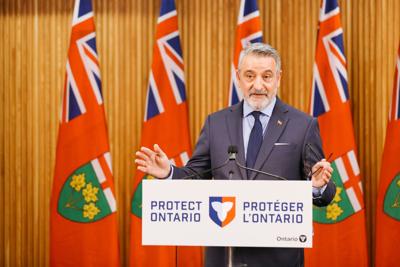Back to school. Back to the same unsolved riddle:
How do we fix the three Rs?
No, not reading, writing and arithmetic — a pedagogical perennial that dates from the 1800s.
I’m talking about other Rs now top of mind in 2025:
Responsibility. Responsiveness. Representation.
Those three Rs are the test that grown-ups keep failing in our schools.
The problem lies not with teachers but trustees — entrusted by voters to run sprawling school boards without learning the lessons of governance. Today, ɫɫ�� trustees are back in the news because they are off the job.
As students go back to school, elected trustees aren’t going back to work. They’ve been sidelined by the provincial government for malpractice bordering on malfeasance.
Both the separate and public school boards in Ontario’s biggest city have been taken over by Queen’s Park, which has sent in outside supervisors — adult supervision — to restore order in the classroom. Predictably, the educational establishment is crying foul.
Trustees are playing the local democracy card, arguing that they are the elected voices of the people. Their allies are accusing Premier Doug Ford of a power grab to disenfranchise voters while imposing the views of his Progressive Conservative government.
Let’s put that proposition to a test with a quick question:
Do you know who your local school trustee is?
It’s a safe bet that most don’t, because the vast majority of people don’t vote for trustees at election time. Across ɫɫ��, aspiring politicians win elected office without winning over anything close to a majority of the electorate.
Voter turnout is declining at all levels. But it is nowhere more true than for trustee elections that tend to attract one-quarter to roughly one-third of the electorate, which is less than half the turnout for more senior levels of government.
Which means that a school trustee can win decision-making power without most voters deciding to give him or her their confidence. Which leads to the challenge of democratic accountability — and the three Rs of responsibility, responsiveness and representation.
School trustees came into being when communities in small towns and rural areas placed a premium on local representation in education. That surely holds true today in many corners of the province where people know their trustees personally.
But that model clearly isn’t working in the big cities and large regions where school trustees are increasingly out of touch and school boards out of control. Earlier this year, Education Minister Paul Calandra essentially suspended the trustees and imposed supervision for the ɫɫ�� public, ɫɫ�� Catholic, Ottawa-Carleton and Dufferin-Peel Catholic boards.
The Dufferin-Peel board is at “risk of defaulting on its financial obligations” while ɫɫ��’s Catholic board and the ɫɫ�� District School Board are facing major shortfalls. These fiscal deficits go hand in hand with democratic deficits for school boards that are supposed to balance the books but are rarely held to account.
This week, the premier argued that Ontarians are “done” with the abuses, citing the Catholic trustees in Brant who flew to Italy on a “junket” to stock up on Italian artwork. Calandra went further by musing about the possibility of eliminating trustees and abolishing school boards altogether.
Apologists for the current system don’t excuse the behaviour of wayward trustees, they merely argue that voters will throw them out next time. At the same time, they accuse Ford’s Tories of an anti-democratic power play.
But if local democracy is dysfunctional and outdated, who can hold trustees truly accountable? Where is the responsibility and responsiveness?
And if Ford’s majority government can still lay claim to a popular mandate — currently sitting at 53 per cent in the latest public opinion poll — who is to say they don’t represent the public will?
The problem with trustees who win elections with a small fraction of the total electorate is that their claim to representation falls flat. Rather than fulfilling the laudable goal of voters being consulted, trustees tend to be co-opted by special interest groups with an axe to grind or an agenda to enact.
The result is local trustees who are either in over their heads or stuck with their heads in the clouds, motivated more by ideology than pedagogy. Contrary to public perception, trustees aren’t educators; their vocation is politics, not pedagogy, and they too often use school boards as stepping stones and training grounds for their next political job at the next level of government.
Critics accuse Ford’s Tories of driving a partisan agenda in targeting trustees, but I’ve written columns about the problems with trustees since long before the Progressive Conservatives won power. Indeed, governments of all political stripes across Canada have been grappling with the challenge in recent years.
Quebec, Nova Scotia, P.E.I. and Newfoundland have experimented with removing trustees, consolidating school boards and abolishing them altogether. Ontario’s time has surely come to embrace those other educational Rs — responsibility, responsiveness and representation.
More on that next week.
Error! Sorry, there was an error processing your request.
There was a problem with the recaptcha. Please try again.
You may unsubscribe at any time. By signing up, you agree to our and . This site is protected by reCAPTCHA and the Google and apply.
Want more of the latest from us? Sign up for more at our newsletter page.



























To join the conversation set a first and last name in your user profile.
Sign in or register for free to join the Conversation